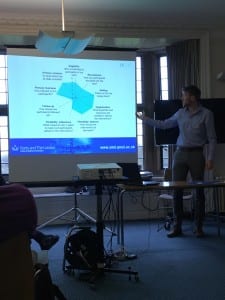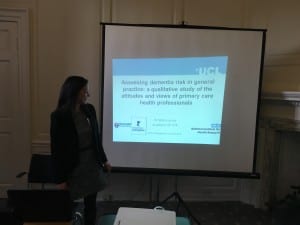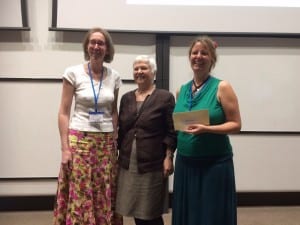Education Research in Primary Care: Co-creating a Project Plan
By Abigail Woodward, on 12 July 2022
This post is written by Sophie Park (Professor of Primary Care and Medical Education) and Dr Emily Owen (Research Assistant, Community Pharmacy and General Practice)
The Society of Academic Primary Care (SAPC) in its 50th year, have collaborated with the Association for the Study of Medical Education (ASME) to host a joint conference event. Our SAPC Education Research Special Interest Group (SIG) met on Tuesday 5th July 2022 to discuss spaces for practitioner-informed research and enquiry.
It is sometimes hard to know where to start. You are a practitioner and have an area of keen interest, but feel the topic is so vast, any firm plans about research feel beyond reach. At the SIG, a group of scientists and practitioner ‘insider researchers’ met to discuss ways of beginning to bring a research idea into focus.
Stakeholder & Patient and Public involvement (PPI)
As practitioners, we often hold a view or perspective which relates to our own embodied experience and meaning-making processes about particular events. Reaching out at the outset of the project is crucial. Attentive listening to how others experience an issue is important, to help understand what others feel the key and important problems are. Continuing these conversations then enables a dynamic movement between inductive (emergent) response to generated data and deductive (pre-determined) focus on the data, embracing a range of views and concerns.
Once you start to have conversations, consider how PPI/stakeholder perspectives might shape how you approach the literature and data about this topic. How might this focus your project and analysis? We shared an on-going review (PROSPERO: CRD42022314280) exploring collaborative and integrated working between General Practice and Community Pharmacies. Having conversations with PPI/stakeholders is informing possible ways of thinking about patient care (access, help-seeking behaviour, psychological safety, continuity); working with and across multi-disciplinary colleagues; and professional development and education. These conversations support an explicit and reflexive movement between experiential priorities and the existing evidence data, helping to prioritise ways of drawing together analytical categories.
Rather than feeling anxious about the impact of your own and others’ experience on the production of data, celebrate your growing insights and understandings about these experiences, and be reflexive about how they are shaping your views during the production of the research protocol, project, and analysis. You will not be able to incorporate all PPI/stakeholder views and agendas, so establish clear expectations about the purpose of your conversations. Enjoy the contrast of views and note how these differences emerge. Might this provide you a new avenue to explore your topic?
Theory
We tend to think that whatever view we hold is ‘normal’. It is helpful, therefore, to share and discuss your ideas with others. These discussions will make visible areas of ‘cognitive dissonance’ or tensions and help to build insight about the particular theories or evidence-base you are using. Start to consider contrasting perspectives. How do these differ from yours? Is your view still helpful to hold, or might you begin to transition to a different position in your approach? This curiosity and movement between different ‘ways of knowing’ are the basis of ‘critical thinking’. These help to cultivate an appetite to understand other positions, supporting you to build a rationale for why you are approaching your research in a particular way, and how you plan to produce particular forms of knowledge outputs or artefacts.
Methods
Some approaches to research will feel more comfortable than others. Be brave and consider multiple options before you plan your project. Consider what it is you want to know, then how a different approach might enable you to know about this topic in a different way. How might each contribute to your overall aims about contribution to practice and policymaking, and moving your disciplinary knowledge field forwards? For example, do you want to create an evaluation project? These often aim to measure the effectiveness of an ‘intervention’, then perhaps make comparative claims. Instead, you might want to conceptualise it as a process, making visible the nature of that process through more exploratory or in-depth qualitative methodologies.
There is no ‘right answer’, and each project/approach will contribute in different and particular ways. What is important, is that you consider these aspects in advance, so that you can plan and anticipate the challenges and opportunities of each theoretical and practical approach from the outset.
Be Realistic
At the beginning, it can feel completely over-whelming. The planning process can feel endless: you want to move onto the practical ‘doing’ of the project as soon as possible. Be patient. Use your enthusiasm to move through the processes above: engagement and dialogue with stakeholders/PPI; reading, and re-reading literature to identify your gap; and mapping the available methods and potential knowledge outputs. Second, keep the project feasible. A focused project will enable you to progress to the next project. Ask yourself what is most important to you at this moment in time and start from there.
Peer Support
Lastly, utilise peer support during your research planning. Enjoy the creative production of your project and share your challenges. Colleagues may have experienced something similar or be able to highlight where you are identifying something innovative in your area of expertise. Through presenting your ideas to an audience, you can shift your thinking about a project: having been immersed in a particular topic, it is sometimes helpful to realise which areas are new or interesting to others. These conversations can also help you to focus your dissemination and spaces for impacting future research, practice, and policy.
Thank you to all who attended the SIG, we look forward to meeting again soon.
 Close
Close





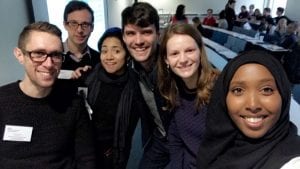

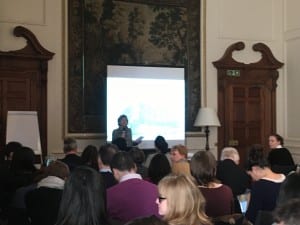
 However, the dragons were fierce in expressing their concern that HELP DIABETES would be another tool best suited to those who are already self motivated. The second pitch was by the medical education department at Imperial College London, who were asking for all medi
However, the dragons were fierce in expressing their concern that HELP DIABETES would be another tool best suited to those who are already self motivated. The second pitch was by the medical education department at Imperial College London, who were asking for all medi They put forward a passionate argument that this would improve their understanding of health inequalities and provide experiential learning of working with marginalised groups. This was a moving presentation that tugged at the heart strings of the audience, but the dragons questioned what would be removed from the curriculum in order to make way for this initiative. The last and final pitch was an online pathway, which offered advice, testing and treatment for chlamydia. Being practical and having demonstrated proof of success, it sealed the deal.
They put forward a passionate argument that this would improve their understanding of health inequalities and provide experiential learning of working with marginalised groups. This was a moving presentation that tugged at the heart strings of the audience, but the dragons questioned what would be removed from the curriculum in order to make way for this initiative. The last and final pitch was an online pathway, which offered advice, testing and treatment for chlamydia. Being practical and having demonstrated proof of success, it sealed the deal. 
